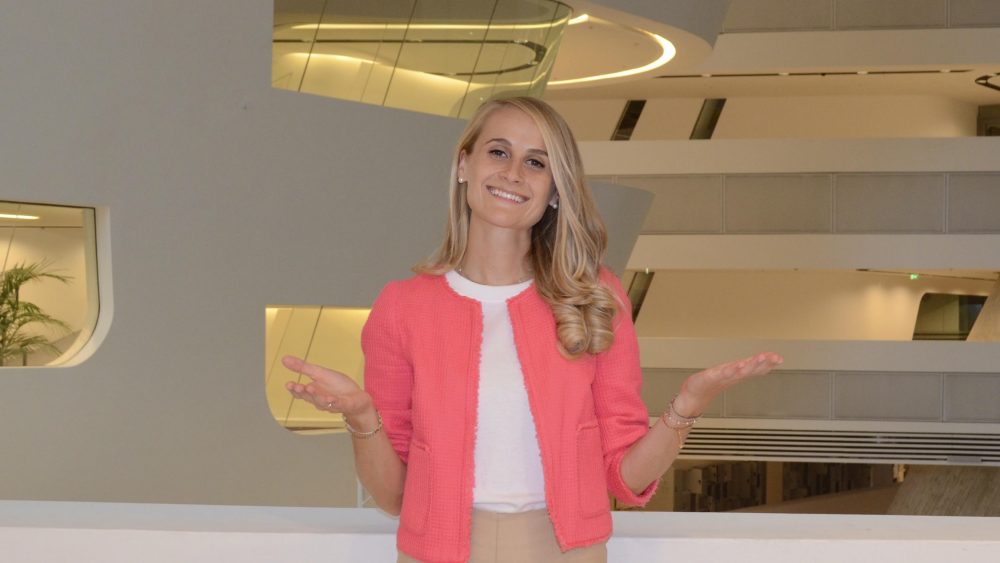Isabelle Joswig is an alumna from the master’s degree programme in Managing People, Knowledge and Change and in our interview we learn more about her life as a consultant at Deloitte and as a participant in the redefined Miss Germany 3.0 contest of 2021.
Hi Isabelle! You graduated from the MSc programme in Managing People, Knowledge and Change at the School of Economics and Management in 2019. What have you been up to since then?
Hi everyone! If I am not mistaken, I was in the first year in which the International Master Class was introduced. So, during my time in Lund I realized that the pleasant student lifestyle would not last forever, and so I wanted to extend it by half a year and went to Vienna to study at WU. I joined a student consulting initiative and had the best time with my friends while traveling through Eastern Europe. During my exchange, I applied to a few consulting firms and quickly decided that I wanted to return to Deloitte, to the team that I interned with prior to my Master’s. Not a day has gone by that I have regretted my decision to have taken a short break between studying and working. Since April 2020 I am employed fulltime within the Human Capital practice.
More specifically, you currently work as a consultant in Workforce Strategy and Solutions at Deloitte. Can you tell us about your workday routine?
I am afraid, that in my job, there is no such thing as a workday routine. Since I started, I was staffed on six very diverse client projects – ranging from a finance transformation in the middle east to leadership workshops here in Munich, where I live. For some projects I started working early in the morning, for others I worked rather long hours. What was the same on all my assignments, however, was my morning cup of tea to kick start my day and my evening walk around the block to reflect on it. I started working at COVID-19 peak-times in the first serious lockdown here in Germany and although I miss meeting my colleagues in person, I enjoy the home office situation as I do not have to travel as much as I used to. The bottom line is that in consulting one must be flexible, so my workday routine must be somewhat flexible as well.
In what ways has your education from Lund University been beneficial in your work?
It has been beneficial in two ways: Content wise and soft-skill wise. I have been able to apply a lot of the knowledge gained – for instance on organizational development, cultural change, leadership, and human resource management. Yet, more importantly, my studies taught me to be disciplined, self-organized, structured, and curious. The Lund University’s teaching approach is known to be collaborative and student-centered to foster critical thinking and the freedom of mind. That is most likely also one of the reasons why I developed a reflected and sometimes critical attitude towards the seemingly “flawless” economy.
This year you are one of the participants in the Miss Germany 3.0 contest. This contest has changed its format from being a beauty pageant to a platform to empower women. Can you tell us more about it? What sparked your interest in the contest?
That’s right, Miss Germany has redefined itself: moving beyond the superficial beauty pageant to a platform for women who want to change the world, shape it with their attitude, conviction, and personality. The motto of this year’s campaign is “be part of the movement”. To me, the “movement” symbolizes the historic social change that we are currently experiencing in Germany. By this I refer to our aspirations for greater diversity, inclusion, and equality – for all minorities. Having a change management background, I know what it takes to embed change in a culture sustainably. Simply put, one must create awareness, understanding and acceptance. As a woman with dyslexia I want to contribute to the acceptance of a feminist and inclusive economy by society at large. To do so, I try to create an understanding in the debate with fact-based contributions. Specifically, I am interested in breaking down stigmas and shedding light on structural discrimination so that disabilities and feminine attributes are accepted and regarded as normal in the business world. I want wo=men to be valued for their femininity and people with disabilities to have equal opportunities.
What does women’s empowerment mean to you? Why is it important?
In one sentence it means: giving women an equivalent stake at the table with equal rights and opportunities. And this is where my time in Sweden had a very positive impact on me, realizing that the country is far more developed than Germany. At the beginning of 2021, the proportion of women on management boards in Germany was 11.5%; in Sweden, it was twice as many. And that’s where structural discrimination has its origin. If we do not have management boards representing our society, decisions will always bypass diverse perspectives, leaving certain groups at an advantage over others. It is thus time to question the way we have recruited, trained, and promoted in the past “like we’ve always done it”, to set up systems and structures that do not exclude minorities. This is not only important for social reasons, but also long overdue from an economic perspective, as it would increase overall economic value added, reduce the (un)adjusted gender pay gap, and lower the unemployment rate.
Do you have any lifehacks that you could not live without?
I am not sure if this qualifies as a lifehack, but I use calendar blockers wisely to not be disturbed during phases of high concentration. Sometimes I even arrange calls with myself to make it look like I am busy, when in reality I am taking a short break to recharge my batteries. The underlying lifehack is to prioritize mental health, I guess.

